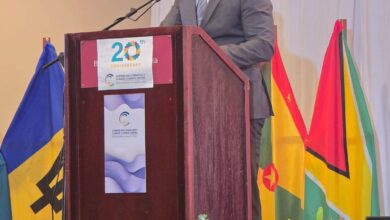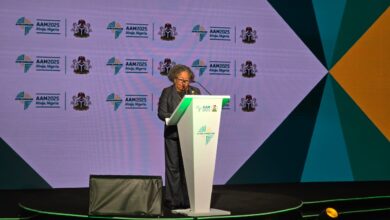GROS ISLET, SAINT LUCIA – “For small developing economies, trade is an important mechanism for nurturing economic growth. In the current international trading environment, however, there is a scaling down and in some cases dismantlement of special arrangements for key Caribbean export products. As a result, there has been dislocation in key agricultural sectors.” This was the message delivered by CARIFORUM’s Principal Negotiator for EPA Negotiations and Director General of the Caribbean Regional Negotiating Machinery (RNM) Ambassador Dr. Richard Bernal to the European Commission today, at the Fourth session of CARIFORUM-EC Principal Negotiators convened in Saint Lucia. The one-day meeting undertook to complete preparations for the Second CARIFORUM-EC Ministerial meeting that follows September 30, also scheduled for Saint Lucia. Speaking on the issue of commodities of export interest to CARIFORUM, including sugar, bananas and rum, Ambassador Bernal was critical of fundamentalist free trade policies, that are eroding what little policy space small, vulnerable developing economies have left – and, foreclosing their development options. The fact is, the Caribbean’s share of global trade is so negligible that preferences cannot possibly be seen as disruptive or somehow an impediment to the operation of the multilateral trading system. With trade liberalization, preferential access granted to developing countries has declined in value; and as a result this has had a deleterious effect on Caribbean societies. In addition to sustaining many of the Region’s economies, preferential access to European markets safeguards the livelihood of thousands of families in the Caribbean. Regarding sugar, Ambassador Bernal reaffirmed the views expressed in The Kisumu Declaration on Sugar (emanating from the recently convened Ninth ACP Special Ministerial Conference on Sugar) on the EU’s reform of its sugar regime, citing the Region’s concern that the European Commission’s proposal in its present form has far reaching and devastating consequences for it’s sugar sector. He noted that the Commission’s offer of accompanying measures for the Africa Caribbean and Pacific (ACP) states, which amounts to €40 million in the first year and an unspecified amount in subsequent years, is inadequate. The current reform proposal envisages a 39 percent price reduction, to be phased in over a four year period. If implemented, it will result in a loss of revenue earnings of approximately US$100 million for CARIFORUM sugar exporting countries. In the case of St. Kitts & Nevis, owing to the unfavourable economic climate characterized by high production costs and declining prices in real terms, a decision was implemented this July to close the operations of the national sugar industry. Regarding bananas, Ambassador Bernal noted that a second arbitration process had been triggered. He noted further that its findings would be binding. Ambassador Bernal emphasized that for banana supplying CARIFORUM countries what is at issue is the livelihood of thousands of farmers, their families and persons employed by businesses associated with the production and export of bananas. The Region has grave concerns as regards the level of the tariff to take effect in the Tariff Only system being undercut any further, as the viability of the banana industry and the welfare of tens of thousands of people are in jeopardy. This point was underscored in Ambassador Bernal’s remarks to European Commission representatives. CARIFORUM’s rum industry, which in some cases dates back 300 years, plays an important role in the generation of foreign exchange earnings, employing over 10,000 people. For most of the life of the Lome Convention, imports of Caribbean rum into the EU were restricted by a complex quota system. As a result, while successful in developing their bulk rum business, Caribbean rum producers were severely hampered in the development of their branded business, owing to the uncertainty of continuous supply which the quota system created. The quota on ACP light rum was removed in 1996, setting the stage for Caribbean rum brand owners to take the opportunity to start the process of building their brands. In 1996, the United States and the EU negotiated a Zero-for-Zero arrangement. As a result, all tariffs and quotas were removed, with the exception of residual tariffs on bulk rums. There is a concern that these tariffs are prematurely being undercut, a point which was reaffirmed at today’s meeting. A second concern of the Region’s rum industry relates to a key programme of assistance to the industry, which is helping to restructure it – through the upgrading of facilities, skills development, improvement of waste disposal and the development and promotion of Caribbean brands. The date for the closure of that project is 2006, but because it started later than expected an extension to 2010 has been requested. There was a call for an update on the status of the European Commission’s response to that request. The third issue raised relates to rules of origin and the threat posed to the industry in the context of revisions to rules of origin, which have been proposed by the Commission. In today’s encounter, Ambassador Bernal also highlighted that CARIFORUM countries are disappointed with the extent to which there appears to be an inertia in ‘development’ featuring in the current round of World Trade Organization (WTO) negotiations, the so-called Doha Round. “There is a tendency for the multilateral trade agenda and related deliberations to be dominated by issues which are important for the principal players, with issues important to smaller countries not featuring as priorities in the dialogue,” Ambassador Bernal noted. Development concerns still need to be satisfactorily reflected in such key areas as Agriculture, non-Agricultural Market Access (NAMA), and Services negotiations. Similarly, much still needs to be accomplished regarding the Small Economies Work Programme. The Region is keen on clear deadlines being set for outstanding work in the Small Economies Work Programme, as well as Special and Differential Treatment (SDT), ahead of the WTO Hong Kong Ministerial. Led by Ambassador Bernal, the CARIFORUM[1] delegation at today’s meeting comprised Brussels-based Ambassadors for Barbados, the Dominican Republic, and Trinidad & Tobago. Some CARIFORUM country Capital-based trade officials were also present, along with representatives of the CARIFORUM, CARICOM and Organisation of Eastern Caribbean States (OECS) Secretariats, and technical experts of the RNM. In addition to Mr. Falkenberg, there were Brussels-based representatives of the European Commission and officials from the Commission’s Caribbean-based Delegations attending the meeting. A CARIFORUM Ministerial caucus is slated for tomorrow (September 29), ahead of Friday’s CARIFORUM-EC Ministerial meeting. [1] For the purposes of EPA negotiations, fifteen Caribbean countries constitute the regional configuration called the Caribbean Forum of ACP States (CARIFORUM); they are: Antigua & Barbuda, The Bahamas, Barbados, Belize, Dominica, the Dominican Republic, Grenada, Guyana, Haiti, Jamaica, St. Kitts & Nevis, St. Lucia, St. Vincent & the Grenadines, Suriname, and Trinidad & Tobago.
News Letter
Subscribe to our mailing list to get the new updates!
Check Also
Close





